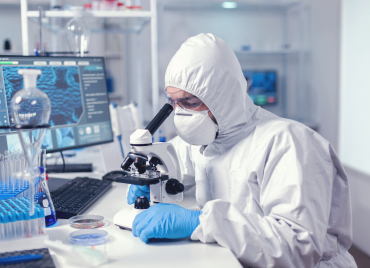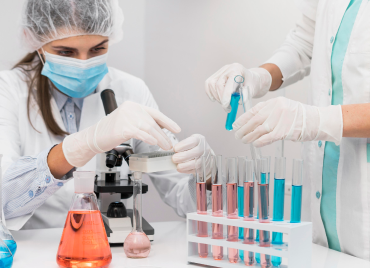Packages
- Saanvidiagnostics
- Packages
-
HAEMATOLOGY
-
BIOCHEMISTRY
-
SEROLOGY
-
MICROBIOLOGY
-
CYTOLOGY
-
HISTOPATHOLOGY
-
MOLECULARBIOLOGY
-
CLINICALPATHOLOGY
-
IMMUNOASSAY
HAEMATOLOGY
 Haematology is the medical specialty that deals with the study of blood, blood-forming organs, and related disorders. It involves diagnosing and treating conditions such as anaemia, clotting disorders, leukaemia, lymphoma, and other blood diseases. Haematology tests help assess overall health, detect abnormalities, and guide effective treatment plans for various blood-related conditions.
Haematology is the medical specialty that deals with the study of blood, blood-forming organs, and related disorders. It involves diagnosing and treating conditions such as anaemia, clotting disorders, leukaemia, lymphoma, and other blood diseases. Haematology tests help assess overall health, detect abnormalities, and guide effective treatment plans for various blood-related conditions.
- HbA1c (Glycated Haemoglobin)
- HLA-B27 – Flowcytometry, EDTA Whole Blood
- D-Dimer
- Absolute Lymphocyte Count
- Absolute Neutrophil Count
- Absolute Eosinophil Count
- Blood Group & RH Type
- Complete Blood Count (CBC)
- Complete Haemogram (CH)
- Differential Count (DC)
- Erythrocyte Sedimentation Rate (ESR)
- Glucose-6-Phosphate Dehydrogenase (G6PD Qualitative)
- Active Partial Thromboplastin Time (APTT)
- Glucose-6-Phosphate Dehydrogenase (G6PD Quantitative)
- Haemoglobin (Hb)
- HB, PCV, TC, DC, ESR
- LE Cell
- Malarial Parasite (Card Test)
- MCHC
- MCV
- Peripheral Blood Smear Examination
- Malarial Parasite (QBC)
- MP Rapid
- Packed Cell Volume (PCV)
- Plasma Fibrinogen Level
- Platelet Count
- Prothrombin Time with INR, Sodium Citrate Whole Blood
- RBC Count
- Reticulocyte Count, EDTA Whole Blood
- TC, DC
- BT, CT
- Absolute Monocyte Count
- NLR
- Mentzer Index
- Absolute Basophil Count
- RDW CV
- RDW SD
- Total Count (WBC)
- Hb Electrophoresis – HPLC, EDTA Whole Blood
- Erythropoietin
- USG
- MPV
- Adrenaline (Epinephrine), EDTA Plasma
BIOCHEMISTRY
 Biochemistry focuses on measuring chemicals and enzymes in blood and body fluids to assess organ function, detect diseases, and monitor treatment. Common tests include liver, kidney, thyroid, lipid, and glucose profiles.
Biochemistry focuses on measuring chemicals and enzymes in blood and body fluids to assess organ function, detect diseases, and monitor treatment. Common tests include liver, kidney, thyroid, lipid, and glucose profiles.
- 125-DI HYDROXY CHOLECALCIFEROL (VITAMIN D3)
- 17-OH-PROGESTERONE
- AFP
- ANTI Ds DNA
- Beta Human Chorionic Gonadotropin Hormone-(Total)
- CA 125 (Ovarian Cancer Marker), Serum
- CARCINO EMBRYONIC ANTIGEN, SERUM
- CORTISOL RANDOM (SERUM)
- Cortisol Serum (3 to 5 PM)
- Estradiol (E2), Serum
- ARTERIAL BLOOD GAS ANALYSIS (ABG)
- ASPARATE AMINOTRANSFERASE (SGOT/AST)
- Bicarbonate, Serum
- BILE ACIDS - TOTAL
- BLOOD UREA NITROGEN (BUN)
- CARBAMAZEPINE
- CEROLOPLASMIN
- COLD AGGLUTINATION TEST
- Cortisol (Morning), Serum
- CREATINE KINASE (CPK), SERUM
- CREATININE PHOSPHOKINASE
- DOUBLE MARKER
- ERYTHROPOIETIN (EPO)
- FASTING BLOOD SUGAR (FBS)
- GAMMA GLUTAMYL TRANSPEPTIDASE (GGT)
- GROWTH HORMONE (GH)
- HDL CHOLESTEROL - DIRECT
- IGG & IGM
- Insulin Fasting, Serum
- INTERLEUKIN 6 (IL-6)
- IONIZED CALCIUM
- IRON & TIBC
- IRON PROFILE
- IRON PROFILE WITH FERRITIN
- Lactate Dehydrogenase (LDH), Serum
- LACTATE LEVEL
- LDL CHOLESTEROL - DIRECT
- LDL/HDL
- LIPASE
- LIPID PROFILE TEST (LPT)
- LITHIUM
- LIVER FUNCTION TEST (LFT)
- MICROALBUMIN, SPOT URINE
- Oral Glucose Challenge Test (OGCT)
- ORAL GLUCOSE TOLERANCE TEST (OGTT)
- PLASMA OSMOLARITY
- POST PRANDIAL BLOOD SUGAR (PPBS)
- PROGESTERONE, SERUM
- RANDOM BLOOD SUGAR (RBS)
- RENAL FUNCTION TEST (RFT)
- SERUM ALBUMIN
- SERUM BILIRUBIN
- SERUM CALCIUM
- SERUM CHLORIDE
- SERUM CREATININE
- SERUM ELECTROLYTES
- SERUM FERRITIN
- Follicle Stimulating Hormone (FSH), Serum
- FREE THYROXINE (FT4)
- FREE TRIIODOTHYRONINE (FT3)
- Luteinizing Hormone (LH), Serum
- Prolactin, Serum
- Prostate Specific Antigen (PSA) Total, Serum
- SERUM CORTISOL
- Testosterone Total, Serum
- Thyroid Peroxidase Antibody (Anti TPO), Serum
- THYROID PROFILE (T3, T4, TSH)
- TORCH IgM
- TORCH PANEL IgG & IgM
- TOTAL THYROXINE (T4)
- TOTAL TRIIODOTHYRONINE (T3)
- TPHA
- TRIPLE MARKER TEST
- CA-19.9
- FREE THYROID PROFILE (FT3,FT4 & TSH)
- B -HCG (FREE)
- THYROID STIMULATING HORMONE - TSH
- TSH - Ultrasensitive
- SERUM AMYLASE
- TROPONIN - I (QUALITATIVE)
- 17- HYDROXY PROGESTERONE
- 17-HYDROXY CORTICOSTEROIDS IN URINE
- 17-KETOGENIC STEROIDS (URINE)
- 24 HOURS URINARY CALCIUM
- 25-HYDROXY VITAMIN D, SERUM
- ALANINE AMINOTRANSFERASE (SGPT/ALT)
- Albumin/Creatinine Ratio
- ALKALINE PHOSPHATASE (ALP)
- ALLERGY PROFILE (Food Veg + Non Veg + Inhalants + Drugs)
- AMMONIA
SEROLOGY
 serology is the study of blood serum to detect antibodies or antigens.
It helps in diagnosing bacterial and viral infections.
These tests can assess a person’s immunity to certain diseases.
They are also useful in monitoring disease progression or treatment response.
Common applications include tests for HIV, hepatitis, dengue, and typhoid.
serology is the study of blood serum to detect antibodies or antigens.
It helps in diagnosing bacterial and viral infections.
These tests can assess a person’s immunity to certain diseases.
They are also useful in monitoring disease progression or treatment response.
Common applications include tests for HIV, hepatitis, dengue, and typhoid.
- CD4
- Chikungunya IgM
- Chlamydia IgG
- COVID-19 Screening (Nucleic Acid Amplification, Qualitative)
- Dengue Profile (IgG, IgM & Ns1Ag)
- Hepatitis A Virus - IgM, Serum
- Hepatitis B Surface Antigen (HBsAg) - Serum
- Hepatitis B Virus Surface Antigen (ELISA)
- Hepatitis C Virus (HCV Antibody) ELISA
- Hepatitis C Virus (HCV) - Serum
- High Sensitive C-Reactive Protein
- HIV 1 & 2 (Serum)
- HIV 1 and 2 Antibody - ELISA
- HIV CLIA
- HSV 1 & 2 IgM
- PCT
- SARS-CoV-2 IgG Antibody Test
- TORCH Panel IgG Serum
- Total IgE Level
- Venereal Disease Research Laboratory (VDRL)
- Weil Felix Test
- Widal (Slide Method), Serum
- Chlamydia IgM
- Herpes Simplex Virus 1 & 2 IgM
- C-Reactive Protein (CRP)
- Hepatitis B Envelope Antigen (HBeAg)
- Lepto IgG & IgM
- Leptospirosis IgM
- Typhoid IgG & IgM
- Hepatitis C
- Anti Cyclic Citrullinated Peptide (Anti CCP), Serum
- Hepatitis B Surface Antibody Total (Anti Hbs), Serum
- SARS-CoV-2 IgG and IgM
- Cytomegalo Virus - IgG
- Dengue Fever Combined Panel (ELISA)
- Hepatitis A Virus IgM
- Herpes Simplex Virus 1 & 2 IgG
- Rapid Plasma Reagin - VDRL
- Rubella Virus - IgG Antibody
- SARS-CoV-2 IgM
- TPHA
- Anti HCV
- Rubella Virus - IgM Antibody
MICROBIOLOGY
 Microbiology is the study of microscopic organisms such as bacteria, viruses, fungi, and parasites.
It plays a vital role in identifying infectious agents that cause diseases.
Laboratory tests in microbiology help guide effective treatment.
Microbiology is the study of microscopic organisms such as bacteria, viruses, fungi, and parasites.
It plays a vital role in identifying infectious agents that cause diseases.
Laboratory tests in microbiology help guide effective treatment.
- CULTURE & SENSITIVITY - BLOOD
- CULTURE & SENSITIVITY - BRONCHIAL WASH
- CULTURE & SENSITIVITY - CATHETER TIP
- CULTURE & SENSITIVITY - CVP TIP
- CULTURE & SENSITIVITY - EAR SWAB
- CULTURE & SENSITIVITY - ET TUBE TIP
- CULTURE & SENSITIVITY - EYE SWAB
- CULTURE & SENSITIVITY - FLUID
- CULTURE & SENSITIVITY - PUS
- CULTURE & SENSITIVITY - SPUTUM
- CULTURE & SENSITIVITY - STOOL
- CULTURE & SENSITIVITY - SYNOVIAL FLUID
- CULTURE & SENSITIVITY - TISSUE
- CULTURE & SENSITIVITY - URINE
- CULTURE & SENSITIVITY - VAGINAL SWAB
- CULTURE & SENSITIVITY - WOUND SWAB
- Grams stain, Sputum
- INDIA INK PREPARATION
- INHALATION ALLERGY TEST
- KOH MOUNT
- SPUTUM FOR AFB
- UMBILICAL TIP FOR CULTURE
- Anti SARS CoV2 spike protein (S1/S2) IgG
- HSV 1 IgM
- SPUTUM FOR AFB (24Hrs Sample)
- Grams Stain, Pus
CYTOLOGY
 Cytology is the study of individual cells to detect abnormalities and diseases.
It plays a crucial role in diagnosing cancers, infections, and inflammatory conditions.
Samples are collected from body fluids or tissue scrapings for microscopic examination.
This method is quick, minimally invasive, and cost-effective.
Cytology helps in early detection, guiding timely treatment decisions.
Cytology is the study of individual cells to detect abnormalities and diseases.
It plays a crucial role in diagnosing cancers, infections, and inflammatory conditions.
Samples are collected from body fluids or tissue scrapings for microscopic examination.
This method is quick, minimally invasive, and cost-effective.
Cytology helps in early detection, guiding timely treatment decisions.
- CSF CYTOLOGY
- PAP SMEAR
- PLEURAL FLUID CYTOLOGY
- SPUTUM CYTOLOGY
- URINE CYTOLOGY
HISTOPATHOLOGY
 Histopathology is the microscopic examination of tissues to study disease processes.
It helps in diagnosing conditions like cancer, infections, and autoimmune disorders.
Tissue samples are obtained through biopsy or surgery and processed for analysis.
The examination reveals structural changes in cells and tissues.
Histopathology is essential for accurate diagnosis and guiding treatment plans.
Histopathology is the microscopic examination of tissues to study disease processes.
It helps in diagnosing conditions like cancer, infections, and autoimmune disorders.
Tissue samples are obtained through biopsy or surgery and processed for analysis.
The examination reveals structural changes in cells and tissues.
Histopathology is essential for accurate diagnosis and guiding treatment plans.
- BIOPSY
- BIOPSY - LARGE SPECIMEN
- BIOPSY - MEDIUM SPECIMEN
- BIOPSY - SMALL SPECIMEN
- BONE MARROW
- Direct Immunofluorescence
- FUNGAL CULTURE
- Genexpert MTB
MOLECULAR BIOLOGY
 Molecular biology focuses on studying biological processes at the molecular level.
It involves the analysis of DNA, RNA, and proteins to understand cellular functions.
Techniques like PCR, sequencing, and blotting are commonly used.
It plays a key role in genetic testing, infectious disease diagnosis, and research.
Molecular biology bridges genetics and biochemistry to advance medical science.
Molecular biology focuses on studying biological processes at the molecular level.
It involves the analysis of DNA, RNA, and proteins to understand cellular functions.
Techniques like PCR, sequencing, and blotting are commonly used.
It plays a key role in genetic testing, infectious disease diagnosis, and research.
Molecular biology bridges genetics and biochemistry to advance medical science.
- COVID-19 (RT-PCR)
- TB - PCR
- CMV DNA Viral Load (Quantitative), By RT PCR
- TB PLATINUM-IGRA
- HBV DNA Quantitative (Viral load)
- H1N1
CLINICAL PATHOLOGY
 Clinical pathology is the branch of pathology that focuses on laboratory analysis of body fluids, such as blood, urine, and cerebrospinal fluid.
It involves tests in hematology, clinical chemistry, microbiology, and immunology to aid diagnosis.
Clinical pathologists interpret lab results to help detect diseases and monitor treatment.
They play a vital role in preventive healthcare by identifying abnormalities early.
This field serves as a crucial link between laboratory science and patient care.
Clinical pathology is the branch of pathology that focuses on laboratory analysis of body fluids, such as blood, urine, and cerebrospinal fluid.
It involves tests in hematology, clinical chemistry, microbiology, and immunology to aid diagnosis.
Clinical pathologists interpret lab results to help detect diseases and monitor treatment.
They play a vital role in preventive healthcare by identifying abnormalities early.
This field serves as a crucial link between laboratory science and patient care.
- 24 HRS URINE FOR CALCIUM
- 24 HRS URINE FOR CHLORIDE (ClO₂)
- 24 HRS URINE FOR CREATININE
- 24 HRS URINE FOR PHOSPHOROUS
- 24 HRS URINE FOR POTASSIUM (K⁺)
- 24 HRS URINE FOR SODIUM (Na)
- 24 HRS URINE PROTEIN
- ASCITIC FLUID ANALYSIS
- Bence Jones Protein Qualitative, Urine
- COMPLETE URINE ANALYSIS
- Cotinine - Urine
- CSF ANALYSIS
- DIRECT COOMB'S TEST (DCT)
- FASTING URINE SUGAR (FUS)
- FNAC
- HCT
- HISTOPATHOLOGY REPORT
- ICT / DCT
- INDIRECT COOMB'S TEST (ICT)
- Occult Blood, Stool
- PERICARDIAL FLUID CYTOLOGY
- PLEURAL FLUID ANALYSIS
- POST PRANDIAL URINE SUGAR (PPUS)
- RANDOM URINE SUGAR (RUS)
- SEMEN ANALYSIS
- SPOT URINE CALCIUM
- SPOT URINE CREATININE
- SPOT URINE PROTEIN
- STOOL FOR HANGING DROP
- STOOL FOR PH
- STOOL FOR REDUCING SUBSTANCE
- STOOL OVA / CYST
- Stool Routine Examination
- URINE ACETONE
- URINE ALBUMIN
- URINE BILE PIGMENT
- URINE BILE SALT
- URINE BILE SALT AND BILE PIGMENTS (BS & BP)
- URINE FOR AFB
- URINE FOR PORPHOBILINOGEN
- URINE KETONE BODIES
- URINE MICROSCOPY
- URINE OCCULT BLOOD
- URINE PREGNANCY TEST (UPT)
- URINE ROUTINE
- URINE SUGAR
- Protein - Random (Urine)
- TISSUE AFB
- Protein / Creatinine Ratio, Spot Urine
IMMUNOASSAY
 Immunoassay is a biochemical test that measures the presence or concentration of a substance using the reaction of an antibody to its antigen.
It is widely used to detect hormones, drugs, proteins, and infectious agents in blood or other body fluids.
These tests are highly sensitive and specific, making them reliable for diagnosis.
Common methods include ELISA, chemiluminescence, and rapid tests.
Immunoassays play a key role in disease screening, monitoring, and research.
Immunoassay is a biochemical test that measures the presence or concentration of a substance using the reaction of an antibody to its antigen.
It is widely used to detect hormones, drugs, proteins, and infectious agents in blood or other body fluids.
These tests are highly sensitive and specific, making them reliable for diagnosis.
Common methods include ELISA, chemiluminescence, and rapid tests.
Immunoassays play a key role in disease screening, monitoring, and research.
- Adreno Corticotropic Hormone (ACTH)
- HOME COLLECTION
Medical Tests Form
Fill and submit the form with your desired medical test or type its name to search from the list.

 Book Appointment
Book Appointment



